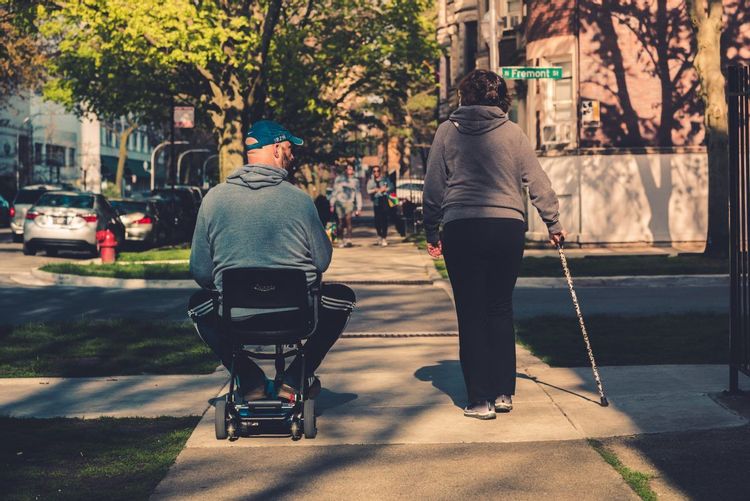Buying a Home with a Disability in 2025: Your Rights and Resources


by Tyler Forte
If you’re living with a physical disability, then you’ve probably conquered your fair share of adversity. Rampless entryways, cramped corridors, and poor lighting can make it feel like the world is conspiring to annoy you. Thankfully, home buying doesn’t have to be this hectic, even for people living with a disability or those who have a disability income. Home ownership has never been more accessible, but before you start your search to buy a house, here are some tips to empower you throughout the homebuying process.
Know Your Home Buying Rights
There are a number of housing laws in place that help safeguard the rights of the disabled and ease the process of finding a residence. Originally, the Fair Housing Act, or FHA, was included as part of a broader piece of Civil Rights legislation. Section 8 of this legislation, passed in 1968, prohibited certain protected classes, like race and gender, from facing discrimination in the housing market based on their inclusion in one of these categories. In 1988, people with disabilities were added as a protected class to Section 8 of the Fair Housing Act (FHA). This means they are protected from discrimination throughout the home buying process. Essentially, if you're a home-buyer with disabilities, you deserve a level playing field, and federal housing authorities are there to make sure you get to participate in the dream of homeownership.
No steering or discrimination
Real estate agents aren’t allowed to steer people with disabilities toward certain properties, and sellers can’t consider a buyer’s physical disability when fielding an offer on their home. Basically, if your physical disability alters the way you are treated, then you have grounds to submit a discrimination complaint to the Department of Housing and Urban Development (HUD).
Accessibility requirements for multi-family homes
The 1988 addition to the Fair Housing Act also extends to accessibility within dwellings. As long as it was first occupied after March 13, 1991, any multifamily housing structure with more than four units must have options that meet these 7 accessibility requirements:
- An accessible building entrance on an accessible route
- Accessible and usable public and common use areas
- Usable doors
- An accessible route into and through the housing unit
- Accessible environmental controls, such as light switches and thermostats
- Reinforced walls for grab bars
- Usable kitchens and bathrooms
These stipulations, unfortunately, do not apply to multifamily dwellings of four units or less, or to single-family homes—even those built after 1991. However, home-buyers seeking an apartment or condo absolutely need to become familiar with these expectations.
Who Can Help With Your Home Buying Process?
Every person, disabled or otherwise, has their own set of requirements when buying a home. Factors like your age, financial flexibility, and type of disability all affect which style of housing you wish to pursue, and what type of financial assistance you might seek. We suggest you talk to someone about your housing and mortgage loan possibilities. An experienced real estate agent can help you understand your options and might expose you to ideas you’ve never even considered. Some real estate agents even specialize in working with disabled clients. You may also seek advice from a mortgage loan expert who can guide you through how to qualify for a mortgage and what financing options are available.
U.S. Department of Housing and Urban Development advisors
You can also talk to an advisor associated with the U.S. Department of Housing and Urban Development. Every state has HUD-approved housing counselors that offer insight into your homebuying process, and they'll give you the most specific information on what to do before you buy a home and how to save money.
What Is The Most Convenient Home Buying Option?
The most straightforward residential option is contemporary multi-family housing, for its adherence to those previously-mentioned FHA regulations, and its more limited income threshold. But if you seek more space, privacy, or just a different housing experience, there are plenty of options that could suit your needs.
What Other Homeownership Options Are Available?
While they might not be perfectly designed for accessibility, certain housing styles are often adaptable to the needs of people living with a disability. Ranch, craftsman, and bungalow-style homes usually allow for ease of access and often feature open, user-friendly floor plans. If you favor construction that’s more move-in ready, many of today’s builders are creating spaces with universal design in mind.
Universal design is an innovative concept that prioritizes convenience and ease to create accessible homes. Think lots of natural light, wall-mounted sinks, generous sightlines, and paddle door handles. By implementing design concepts that accommodate almost all needs, these properties are move-in ready for nearly anyone. That being said, some of these properties are more adaptable than accessible, which means you might have to make a few alterations based on your particular needs.
What Are Your Financing Options?
If you’re looking to buy a home or make your property more accessible, there are plenty of financial assistance programs available to people with disabilities. Depending on your location, age, and type of disability, there may be dozens of programs designed to help you either find or create your perfect home. Some of these are nationwide programs, while others are geared to certain local housing options. Not thrilled about the government route to securing a home loan? Assistance programs like Habitat for Humanity are easily accessible. You might have to do a little research to find out which programs apply to your area, but a few great places to start include:
Federal Housing Administration (FHA) Loans
These federally-insured loans are ideal for low-to-moderate-income households looking to secure a mortgage with the help of disability income. As long as you have a credit score of at least 580, you can receive a loan for up to 96.5% of your home’s value. They even have a loan option that includes the cost of necessary repairs on a new property. First, you’ll have to find an FHA-approved lender, but that’s a speed bump on the otherwise clear road to accessible homeownership.
One advantage of this loan assistance program is the wide variety of mortgage options they offer. People age 62 and above can get their home equity payment quickly turned into cash through the Home Equity Conversion Mortgage program. The FHA even offers a type of mortgage that includes resources to upgrade a home's energy efficiency. Depending on your financial needs, this is a flexible, accessible mortgage assistance program that's likely to work for you.
Section 8 Homeownership Voucher Program
For first-time, low-income homeowners that can stand to wait a little while for approval, this homeownership voucher program, courtesy of HUD, is often the best financial option for buying a home. Most associate the HCV with securing rent, but this homeownership option can also help cover monthly mortgage payments and expenses associated with making a home accessible. There are a few drawbacks to this homeownership voucher program: not every Public Housing Authority offers the program, and waiting lists can be many months long. However, with mortgage payments adjusted to be about 30% of a household's monthly earnings, many first time home buyers find that the savings are worth the delay. After all, this voucher program covers an impressive range of mortgage expenses including:
- Mortgage insurance
- Maintenance and major repairs
- Costs to make a property accessible
Fannie Mae
Fannie Mae partners with HUD to provide a range of mortgage and rental services. First, Fannie Mae makes it easy to get pre-approved for, and eventually secure, a mortgage through low down payment options and an acceptance of non-traditional income sources. The company is even willing to approve a mortgage based completely on one's long-term disability income. Fannie Mae's Community HomeChoice program can help many people with disabilities and disability income secure a mortgage, and their HomeReady mortgage can finance up to 97% of a home purchase. Forgiving debt-to-income, credit, and down payment requirements all help lower the threshold to get you in your ideal dwelling. Buyers also tend to get these loans at a competitive interest rate that keeps people in their homes for years to come.
Another advantage to Fannie Mae is their HomePath program, through which home-buyers can gain access to exclusive company-owned houses. This can get you in a quality home for a below-market price. Programs like these work to get people with disabilities into the living situation they need, with as little hassle as possible.
Habitat for Humanity
Habitat for Humanity is renowned for working with qualified families to create accessible environments. Their designs tend to have wide openings and no-step entries that cater to all individuals. Home-buyers can avoid making a down payment on their house by logging hours of "sweat equity", in which they work to build other homes for the organization. Habitat houses also usually feature a mortgage loan interest rate between 0% and 2%, which makes them reasonable for almost anyone with an acceptable credit history. Along with the hours on the worksite, you’ll have to show your commitment to owning a house by attending classes on responsible home-ownership. The organization also performs a fairly extensive background check to make sure that applicants are properly equipped to take advantage of this housing privilege. Luckily, if you complete the process you are in line for a well-built, affordable house that fits your needs.
USDA Single Family Direct Home Loans
The Direct home loan program provides subsidized home loan options for low-income households in rural areas. For those struggling to get an affordable mortgage, or find safe housing, this program offers some mortgage loans with no down payment. An interest rate for these mortgages can also be as low as 1%. As long as this home is your primary residence and you stay in it for an extended period of time, these benefits could be yours.
As a more flexible USDA option for home loans, the USDA Guaranteed loan program allows for a higher income and more square footage. Also, there are more potential lenders because the program is backed by the government through private mortgage companies.
Social Security and Supplemental Security Income Disability Programs
Low-income families or individuals dealing with disabilities, if they've paid Social Security taxes long enough and recently enough, might qualify for this service provided by the Social Security Administration. Under the Social Security Disability Insurance program those who are "insured", meaning they've met the payment guidelines, qualify for a social security disability benefit. This benefit can be pretty substantial, and there's no asset limit for those who qualify. Recipients are often entitled to large back payments, and as long as your credit is strong enough to weather the application and approval process, the SSDI can help with a down payment and getting approved for a mortgage on a house. You can even buy a house without living in it and it won't affect your eligibility for the benefit.
Those with disabilities who don't have the luxury of Social Security can still receive disability benefits through its sister program, SSI. This financial assistance program offers low-income households monthly help, provided that their assets don't exceed the $2,000 limit for an individual, or the $3,000 limit for a family. Any disabled person can apply for this, and there is now an easy online application for those between the ages of 18 and 65.
Options For Upgrading Your Home To Meet Accessibility Standards
There is a multitude of assistance programs that help disabled individuals alter their homes. Although many are geared toward specific conditions/demographics, like blindness or retired people, there’s a good chance that if you have a disability someone is out there just waiting to help. Rebuilding Together Americorps, The Gary Sinise Foundation, and ModestNeeds.org, among others, make sure that you don’t break the bank for suitable housing. For a more exhaustive list of these options tailored to your area, check out this directory.
Many of these assistance programs aren't national but are administered through state and local agencies. In Tennessee, for instance, programs like Emergency Repair and Home Modifications and Ramps offer resources to help people with disabilities improve their living conditions. Getting to know these programs will likely put you in contact with those best positioned to meet your specific needs.
Options for Disabled Veterans
Apart from conventional VA loans, disabled veterans—even those not injured in the line of duty—have special financing options for accessible housing. Veterans with certain service or aging-related disabilities can qualify for a Special Housing Adaptation (SHA) grant, which allows one access to user-friendly housing and home modifications. Not all disabled veterans qualify for this loan program, but those who do can apply for assistance with up to three different projects, provided that they don't exceed the maximum budget, which in 2020 was $18,074. Those injured in the line of duty after September 11th, 2001 might qualify for the Homes for Our Troops program, which offers accessible housing to disabled veterans. This remarkable charity builds homes adapted to a specific veteran's needs, right where they want to live. Then they donate those homes to veterans with no mortgage requirement. It's an exceptional program, but the waiting list can be long for those who just can't stand to put homeownership on hold.
About Felix Homes
Felix Homes is where five-star service meets low commissions! To date, we've saved our clients $1,610,738 in commission fees and have earned 120 five-star reviews on Google!
How are we able to offer five-star service AND lower commission fees? It's simple:
- We're an independently owned brokerage – not a franchise which allows us to keep more of the commission we earn.
- By offering a lower commission, more folks want to work with us which means we close more deals. By closing more deals, we can pass more savings along to our customers!
Still not convinced? Read all about our low-commission mission here.
If you have any questions about the state of the market or the home buying/selling process, please feel free to contact us at contact@felixhomes.com or 615-354-5731.




